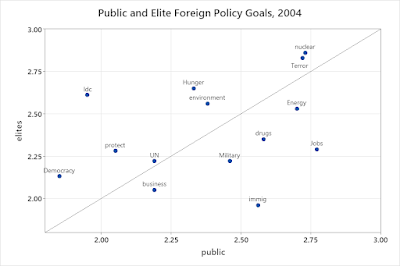A negative view of "elites" has become a central part of American conservatism. It was always present to some degree, but it used to be focused on specific groups, especially journalists and intellectuals. Now it's become a more general vision of a "deep state," "blob," or "uniparty." In some versions, the elite has left-wing views and despises ordinary Americans--I wrote about one example a few weeks ago. But there's also another version, which doesn't see the difference purely in terms of left and right, and where the elite is just not very aware of the public. According to Oren Cass, the underlying problem in America is "elites who remain fully committed to their own preferences, to pulling the levers of power for their own benefit and to offering candidates in both parties who would preserve the status quo." By "candidates in both parties" he doesn't mean Biden and Trump, but Biden and Nikki Haley--Trump represents the people, although he does that "imperfectly." Although Cass doesn't offer any data on elite opinion, he is right in suggesting that Trump appeals to some views that are popular in the public but not among elites.
The figure is from a Chicago Council on Foreign Relations (Chicago Council on Global Affairs) survey that asked people and members of "foreign policy elites" to rank the importance of various possible foreign policy goals (1-3, higher means more important). The ones below the diagonal line were ranked higher by the public than by elites; the ones above the line were ranked higher by elites. The biggest gaps are for "helping to improve the standard of living of less developed nations" (ranked higher by elites), "controlling and reducing illegal immigration" (ranked higher by the public), and "protecting the jobs of American workers" (ranked higher by the public).
Here is the corresponding figure for 2016. The question on improving the standard of living wasn't included in this survey, but illegal immigration and jobs were, and again they were ranked more important by the public. The 2016 survey added a question on "attaining US energy independence," which was ranked higher by the public (the 2004 survey had a question on "securing adequate supplies of energy, which was also ranked higher by the public). The biggest gap in the other direction was "limiting climate change"--that question wasn't in the 2004 survey, but "improving the global environment" was ranked higher by elites in both surveys. Compared to the general public, elites also placed a higher priority on "defending our allies' security."
So there are large and persisting gaps between elite and public opinion, and the goals which the public ranks more highly are ones that Trump has emphasized. Cass says that "leaders might seek to shape public opinion and alter preferences — indeed, that is part of leading — but they must yield to the outcome. Their obligation is to pursue the community’s priorities, not their own." The problem with this principle is that different potential goals are not independent of each other--people think protecting American jobs is important, but it's safe to say that they also think that having low prices is important. On the other hand, sometimes goals are complementary--for example, a higher standard of living in less developed countries might reduce illegal immigration. So if elites don't follow public opinion on specific policies, it's not necessarily because they are thinking about their own benefit: it could be because they think they have a better understanding of how to achieve "the community's priorities," as they understand them. Of course, those beliefs could be wrong, and Cass suggests they are: his essay is called "This is what elite failure looks like." Many other observers have offered similar accounts: the idea is that decades of policy failures led to popular discontent and a revolt against the elites. But have elites actually done so badly? I'll look at that question in a future post.


No comments:
Post a Comment